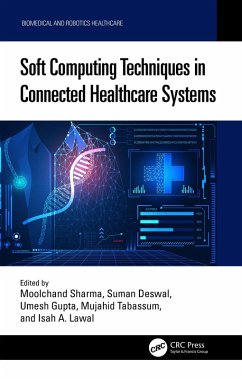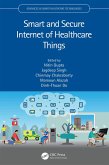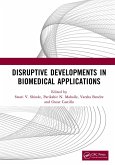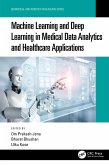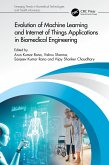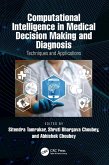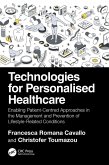Soft Computing Techniques in Connected Healthcare Systems (eBook, ePUB)
Redaktion: Sharma, Moolchand; Lawal, Isah; Tabassum, Mujahid; Gupta, Umesh; Deswal, Suman
137,95 €
137,95 €
inkl. MwSt.
Sofort per Download lieferbar

69 °P sammeln
137,95 €
Als Download kaufen

137,95 €
inkl. MwSt.
Sofort per Download lieferbar

69 °P sammeln
Jetzt verschenken
Alle Infos zum eBook verschenken
137,95 €
inkl. MwSt.
Sofort per Download lieferbar
Alle Infos zum eBook verschenken

69 °P sammeln
Soft Computing Techniques in Connected Healthcare Systems (eBook, ePUB)
Redaktion: Sharma, Moolchand; Lawal, Isah; Tabassum, Mujahid; Gupta, Umesh; Deswal, Suman
- Format: ePub
- Merkliste
- Auf die Merkliste
- Bewerten Bewerten
- Teilen
- Produkt teilen
- Produkterinnerung
- Produkterinnerung

Bitte loggen Sie sich zunächst in Ihr Kundenkonto ein oder registrieren Sie sich bei
bücher.de, um das eBook-Abo tolino select nutzen zu können.
Hier können Sie sich einloggen
Hier können Sie sich einloggen
Sie sind bereits eingeloggt. Klicken Sie auf 2. tolino select Abo, um fortzufahren.

Bitte loggen Sie sich zunächst in Ihr Kundenkonto ein oder registrieren Sie sich bei bücher.de, um das eBook-Abo tolino select nutzen zu können.
This book provides examination of applications of soft computing techniques related to healthcare systems and can be used as a reference guide for assessing the roles that various techniques, such as machine learning, fuzzy logic, and statistical mathematics, play in the advancements of smart healthcare systems.
- Geräte: eReader
- mit Kopierschutz
- eBook Hilfe
Andere Kunden interessierten sich auch für
![Soft Computing Techniques in Connected Healthcare Systems (eBook, PDF) Soft Computing Techniques in Connected Healthcare Systems (eBook, PDF)]() Soft Computing Techniques in Connected Healthcare Systems (eBook, PDF)137,95 €
Soft Computing Techniques in Connected Healthcare Systems (eBook, PDF)137,95 €![Smart and Secure Internet of Healthcare Things (eBook, ePUB) Smart and Secure Internet of Healthcare Things (eBook, ePUB)]() Smart and Secure Internet of Healthcare Things (eBook, ePUB)46,95 €
Smart and Secure Internet of Healthcare Things (eBook, ePUB)46,95 €![Disruptive Developments in Biomedical Applications (eBook, ePUB) Disruptive Developments in Biomedical Applications (eBook, ePUB)]() Disruptive Developments in Biomedical Applications (eBook, ePUB)60,95 €
Disruptive Developments in Biomedical Applications (eBook, ePUB)60,95 €![Machine Learning and Deep Learning in Medical Data Analytics and Healthcare Applications (eBook, ePUB) Machine Learning and Deep Learning in Medical Data Analytics and Healthcare Applications (eBook, ePUB)]() Machine Learning and Deep Learning in Medical Data Analytics and Healthcare Applications (eBook, ePUB)51,95 €
Machine Learning and Deep Learning in Medical Data Analytics and Healthcare Applications (eBook, ePUB)51,95 €![Evolution of Machine Learning and Internet of Things Applications in Biomedical Engineering (eBook, ePUB) Evolution of Machine Learning and Internet of Things Applications in Biomedical Engineering (eBook, ePUB)]() Evolution of Machine Learning and Internet of Things Applications in Biomedical Engineering (eBook, ePUB)52,95 €
Evolution of Machine Learning and Internet of Things Applications in Biomedical Engineering (eBook, ePUB)52,95 €![Computational Intelligence in Medical Decision Making and Diagnosis (eBook, ePUB) Computational Intelligence in Medical Decision Making and Diagnosis (eBook, ePUB)]() Computational Intelligence in Medical Decision Making and Diagnosis (eBook, ePUB)48,95 €
Computational Intelligence in Medical Decision Making and Diagnosis (eBook, ePUB)48,95 €![Technologies for Personalised Healthcare (eBook, ePUB) Technologies for Personalised Healthcare (eBook, ePUB)]() Francesca Romana CavalloTechnologies for Personalised Healthcare (eBook, ePUB)102,95 €
Francesca Romana CavalloTechnologies for Personalised Healthcare (eBook, ePUB)102,95 €-
-
-
This book provides examination of applications of soft computing techniques related to healthcare systems and can be used as a reference guide for assessing the roles that various techniques, such as machine learning, fuzzy logic, and statistical mathematics, play in the advancements of smart healthcare systems.
Dieser Download kann aus rechtlichen Gründen nur mit Rechnungsadresse in A, B, BG, CY, CZ, D, DK, EW, E, FIN, F, GR, HR, H, IRL, I, LT, L, LR, M, NL, PL, P, R, S, SLO, SK ausgeliefert werden.
Produktdetails
- Produktdetails
- Verlag: Taylor & Francis eBooks
- Seitenzahl: 312
- Erscheinungstermin: 20. Dezember 2023
- Englisch
- ISBN-13: 9781003808817
- Artikelnr.: 69507330
- Verlag: Taylor & Francis eBooks
- Seitenzahl: 312
- Erscheinungstermin: 20. Dezember 2023
- Englisch
- ISBN-13: 9781003808817
- Artikelnr.: 69507330
- Herstellerkennzeichnung Die Herstellerinformationen sind derzeit nicht verfügbar.
Moolchand Sharma is currently an Assistant Professor in the Department of Computer Science and Engineering at Maharaja Agrasen Institute of Technology, GGSIPU, Delhi. He has published scientific research publications in reputed International Journals and Conferences, including SCI indexed and Scopus indexed Journals such as Cognitive Systems Research (Elsevier), Physical Communication (Elsevier), Intelligent Decision Technologies: An International Journal, Cyber-Physical Systems (Taylor & Francis Group), International Journal of Image & Graphics (World Scientific), International Journal of Innovative Computing and Applications (Inderscience) & Innovative Computing and Communication Journal (Scientific Peer reviewed Journal). He has authored/co-authored chapters with international publishers like Elsevier, Springer, Wiley, and De Gruyter. He has authored/edited four books with a national/international level publisher (CRC Press, Bhavya Publications). His research area includes Artificial Intelligence, Nature-Inspired Computing, Security in Cloud Computing, Machine Learning, and Search Engine Optimization. He is associated with various professional bodies, such as IEEE, ISTE, IAENG, ICSES, UACEE, Internet Society, Universal Inovators research lab life membership, etc. He possesses teaching experience of more than 10 years. He is the co-convener of ICICC, DOSCI, ICDAM & ICCCN Springer Scopus Indexed conference series and ICCRDA-2020 Scopus Indexed IOP Material Science & Engineering conference series. He is also the organizer and Co-Convener of the International Conference on Innovations and Ideas toward Patents (ICIIP) series. He is also the Advisory and TPC committee member of the ICCIDS-2022 Elsevier SSRN Conference. He is also the reviewer of many reputed journals, such as Springer, Elsevier, IEEE, Wiley, Taylor & Francis Group, IJEECS, and World Scientific Journal, and many springer conferences. He has also served as a session chair in many international Springer conferences. He is currently a doctoral researcher at DCR University of Science and Technology, Haryana. He completed his Post Graduation in 2012 from SRM UNIVERSITY, NCR CAMPUS, GHAZIABAD, and Graduated in 2010 from KNGD MODI ENGG. COLLEGE, GBTU. Prof. Suman Deswal holds a Ph.D. from DCR University of Science and Technology, Murthal, India. She completed her M.Tech. (CSE) from Kurukshetra University, Kurukshetra, India, and B.Tech. (Computer Science and Engg.) from CR State College of Engg., Murthal, India, in 2009 and 1998, respectively. She possesses 21 years of teaching experience and is presently working as a Professor in the Department of Computer Science and Engineering at DCR University of Science and Technology, Murthal, India. Her research area includes Wireless Networks, Heterogeneous Networks, Distributed Systems, Machine Learning, Deep Learning Approaches, and Bioinformatics. She has many research papers to her credit in reputed journals, including SCI indexed, and Scopus Indexed Journals and conferences. Her publications have more than 143 citations. She is also the reviewer of many reputed journals, such as Springer, Elsevier, IEEE, Wiley, and International IEEE and Springer Conferences. She is a member of IAENG and Computer Society of India (CSI). Dr. Umesh Gupta is currently an Associate Professor at Bennett University, India. He received a Doctor of Philosophy (Ph.D.) (Machine Learning) from the National Institute of Technology, Arunachal Pradesh, India. He was awarded a gold medal for his Master of Engineering (M.E.) from the National Institute of Technical Teachers Training and Research (NITTTR), Chandigarh, India, and Bachelor of Technology (B.Tech.) from Dr. APJ, Abdul Kalam Technical University, Lucknow, India. His research interests include SVM, ELM, RVFL, Machine Learning, and Deep Learning Approaches. He has published over 35 referred journal and conference papers of international repute. His scientific research has been published in reputable international journals and conferences, including SCI-indexed and Scopus-indexed journals like Applied Soft Computing (Elsevier) and Applied Intelligence (Springer), each of which is a peer-reviewed journal. His publications have more than 158 citations with an h-index of 8 and an i10-index of 8 on Google Scholar as of March 1, 2023. He is a senior Member of IEEE (SMIEEE) and an active member of ACM, CSTA, and other scientific societies. He has also reviewed papers for many scientific journals and conferences in the United States and other foreign countries. He led the sessions at the 6th International Conference (ICICC-2023), 3rd International Conference on Data Analytics and Management (ICDAM 2023), the 3rd International Conference on Computing and Communication Networks (ICCCN 2022), and other international conferences like Springer ETTIS 2022 and 2023. He is currently supervising two Ph.D. students. He is the co-principal investigator (co-PI) of two major research projects. He published three patents in the years 2021-2023. He also published four book chapters with Springer, CRC. Mujahid Tabassum is a lecturer at Noroff University College (Noroff Accelerate), Kristiansand, Norway. He has completed a Master of Science (Specialization in Computer System Engineering) degree from Halmstad University, Sweden, and a bachelor's degree from the University of Wollongong, Australia. He has worked in various international universities in Malaysia and the Middle East, making his profile well reputed. He has managed and led several student and research projects and published several research articles in well-known SCI journals and Scopus conferences. He is a qualified "Chartered Engineer-CEng" registered with the Engineering Council, UK. He has 13 years of teaching experience. He is a Cisco, Microsoft, Linux, Security, and IoT-certified instructor. His research interests include Computer Networks, AI, Wireless Sensor networks, IoT, Security, and Applications. He has published several Scopus papers, journals, and book chapters. He is a Member of IEEE, a Member of the Institution of Engineering and Technology, a Member of IAENG, a Member of the Australia Computing Society (ACS), and a Member of MBOT Malaysia. He is an active member of the Society of IT Engineers and Researchers, UK. Dr. Isah A. Lawal was an Erasmus Mundus Joint Doctorate Fellow with over 10 years of professional work experience, including teaching and research. He has participated in several collaborative multidisciplinary research projects at different universities, including in Europe (Italy and United Kingdom) and the Middle East (Saudi Arabia). He has authored several articles in peer-reviewed journals and conferences ranging from data-driven predictive modeling to machine learning for intelligent systems. In addition to actively engaging in research, he has taught Data Mining, Innovative Systems, and Artificial Intelligence courses at both undergraduate and postgraduate levels. Dr. Isah's research interests include the multidisciplinary application of Machine Learning Techniques, Data Mining, and Smart Systems. He has supervised and examined several undergraduate projects and master's thesis in Statistical Data Analysis, Data Visualisation, and Natural Language Processing. Dr. Isah is currently participating in the EEA granted data-driven public administration project as a consultant for the Department for Strategic Development and Coordination of Public Administration, Ministry of the Interior of the Czech Republic. The project involves using big data analytics to analyze public mobility from mobile positioning data to efficiently plan and distribute public services and public administration in the Czech Republic.
1. Automation in Healthcare: Forecast and Outcome: A Case Study
2. Optimizing Smartphone Addiction Questionnaires with Smartphone
Application and Soft Computing: An Intelligent Smartphone Usage Behavior
Assessment Model
3. Artificial Neural Network Model for Automated Medical Diagnosis
4. Analysing of Heterogeneous Perceptions of a Mutually Dependent Health
Ecosystem System Survey
5. Intuitionsitic Fuzzy-Based Technique Ordered Preference by Similarity to
the Ideal Solution (TOPSIS) Method: An MCDM Approach for the Medical
Decision Making of Diseases
6. Design of a Heuristic IoT-Based Approach as a Solution to a Self-Aware
Social Distancing Paradigm
7. Combined 3D Mesh and Generative Adversarial Network-Based Improved Liver
Segmentation in Computed Tomography Images
8. Applying Privacy by Design to Connected Healthcare Ecosystems
9. Next-Generation Platforms for Device Monitoring, Management, and
Monetization for Healthcare
10. Real-Time Classification and Hepatitis B Detection with Evolutionary
Data Mining Approach
11. Healthcare Transformation Using Soft Computing Approaches and IoT
protocols.
12. Automated Detection and Classification of Focal and Nonfocal EEG
Signals Using Ensemble Empirical Mode Decomposition and ANN Classifier
13. Challenges and Future Directions of Fuzzy System in Healthcare Systems:
A Survey
14. Perceptual Hashing Function for Medical Images: Overview, Challenges,
and the Future
15. Deploying Machine Learning Methods for Human Emotion Recognition
16. Maternal Health Risk Prediction Model using Artificial Neural Network
2. Optimizing Smartphone Addiction Questionnaires with Smartphone
Application and Soft Computing: An Intelligent Smartphone Usage Behavior
Assessment Model
3. Artificial Neural Network Model for Automated Medical Diagnosis
4. Analysing of Heterogeneous Perceptions of a Mutually Dependent Health
Ecosystem System Survey
5. Intuitionsitic Fuzzy-Based Technique Ordered Preference by Similarity to
the Ideal Solution (TOPSIS) Method: An MCDM Approach for the Medical
Decision Making of Diseases
6. Design of a Heuristic IoT-Based Approach as a Solution to a Self-Aware
Social Distancing Paradigm
7. Combined 3D Mesh and Generative Adversarial Network-Based Improved Liver
Segmentation in Computed Tomography Images
8. Applying Privacy by Design to Connected Healthcare Ecosystems
9. Next-Generation Platforms for Device Monitoring, Management, and
Monetization for Healthcare
10. Real-Time Classification and Hepatitis B Detection with Evolutionary
Data Mining Approach
11. Healthcare Transformation Using Soft Computing Approaches and IoT
protocols.
12. Automated Detection and Classification of Focal and Nonfocal EEG
Signals Using Ensemble Empirical Mode Decomposition and ANN Classifier
13. Challenges and Future Directions of Fuzzy System in Healthcare Systems:
A Survey
14. Perceptual Hashing Function for Medical Images: Overview, Challenges,
and the Future
15. Deploying Machine Learning Methods for Human Emotion Recognition
16. Maternal Health Risk Prediction Model using Artificial Neural Network
1. Automation in Healthcare: Forecast and Outcome: A Case Study
2. Optimizing Smartphone Addiction Questionnaires with Smartphone
Application and Soft Computing: An Intelligent Smartphone Usage Behavior
Assessment Model
3. Artificial Neural Network Model for Automated Medical Diagnosis
4. Analysing of Heterogeneous Perceptions of a Mutually Dependent Health
Ecosystem System Survey
5. Intuitionsitic Fuzzy-Based Technique Ordered Preference by Similarity to
the Ideal Solution (TOPSIS) Method: An MCDM Approach for the Medical
Decision Making of Diseases
6. Design of a Heuristic IoT-Based Approach as a Solution to a Self-Aware
Social Distancing Paradigm
7. Combined 3D Mesh and Generative Adversarial Network-Based Improved Liver
Segmentation in Computed Tomography Images
8. Applying Privacy by Design to Connected Healthcare Ecosystems
9. Next-Generation Platforms for Device Monitoring, Management, and
Monetization for Healthcare
10. Real-Time Classification and Hepatitis B Detection with Evolutionary
Data Mining Approach
11. Healthcare Transformation Using Soft Computing Approaches and IoT
protocols.
12. Automated Detection and Classification of Focal and Nonfocal EEG
Signals Using Ensemble Empirical Mode Decomposition and ANN Classifier
13. Challenges and Future Directions of Fuzzy System in Healthcare Systems:
A Survey
14. Perceptual Hashing Function for Medical Images: Overview, Challenges,
and the Future
15. Deploying Machine Learning Methods for Human Emotion Recognition
16. Maternal Health Risk Prediction Model using Artificial Neural Network
2. Optimizing Smartphone Addiction Questionnaires with Smartphone
Application and Soft Computing: An Intelligent Smartphone Usage Behavior
Assessment Model
3. Artificial Neural Network Model for Automated Medical Diagnosis
4. Analysing of Heterogeneous Perceptions of a Mutually Dependent Health
Ecosystem System Survey
5. Intuitionsitic Fuzzy-Based Technique Ordered Preference by Similarity to
the Ideal Solution (TOPSIS) Method: An MCDM Approach for the Medical
Decision Making of Diseases
6. Design of a Heuristic IoT-Based Approach as a Solution to a Self-Aware
Social Distancing Paradigm
7. Combined 3D Mesh and Generative Adversarial Network-Based Improved Liver
Segmentation in Computed Tomography Images
8. Applying Privacy by Design to Connected Healthcare Ecosystems
9. Next-Generation Platforms for Device Monitoring, Management, and
Monetization for Healthcare
10. Real-Time Classification and Hepatitis B Detection with Evolutionary
Data Mining Approach
11. Healthcare Transformation Using Soft Computing Approaches and IoT
protocols.
12. Automated Detection and Classification of Focal and Nonfocal EEG
Signals Using Ensemble Empirical Mode Decomposition and ANN Classifier
13. Challenges and Future Directions of Fuzzy System in Healthcare Systems:
A Survey
14. Perceptual Hashing Function for Medical Images: Overview, Challenges,
and the Future
15. Deploying Machine Learning Methods for Human Emotion Recognition
16. Maternal Health Risk Prediction Model using Artificial Neural Network
